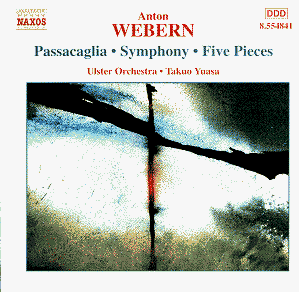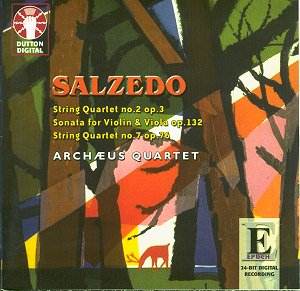 Composer: Anton Webern
Composer: Anton Webern
Works: Passacaglia Op 1 (1908), Five Movements for Strings Op 5 (1929), Six Pieces Op 6 (1909 rev 1928), Five Pieces Op 10 (1911-13), Symphony Op 21 (1928), Variations Op 30 (1940)
Performers: Ulster Orchestra / Takuo Yuasa
Recording: Recorded Ulster Hall, March 29th-30th 2000
Label: NAXOS
Anton Webern, a pivotal figure in the early 20th-century avant-garde, remains an enigmatic presence in classical music. His orchestral works, often characterized by extreme brevity and meticulous attention to timbre, reflect a radical departure from the lush Romantic idiom that preceded him. The selections presented in this Naxos release, performed by the Ulster Orchestra under the baton of Takuo Yuasa, illuminate Webern’s evolution from late-Romantic harmonies to his later serial techniques, providing a comprehensive survey of his orchestral output.
Yuasa’s interpretation largely succeeds in navigating Webern’s complex sound world, revealing the intricate textures and delicate structures inherent in the music. The Passacaglia, while grounded in the late-Romantic tradition, is performed with an urgency that underscores its emotional undercurrents. However, the recording’s balance presents some challenges; the theme, introduced in the lower strings, struggles to emerge clearly at the outset, often requiring elevation of the volume, which results in a jarring contrast during climactic moments. Comparatively, Karajan’s esteemed recording offers a more balanced approach, allowing the thematic material to resonate without overshadowing subsequent developments.
The Five Movements for Strings and Six Pieces Op 6 represent Webern’s mid-career shift towards a more radical aesthetic. In the orchestral pieces, Yuasa’s brisk tempos invigorate the music, yet at times, one longs for a more spacious interpretation. The microcosmic nature of these works demands a careful attention to detail that can be lost in a hurried performance. The fourth piece of Op 6, a funeral march, emerges as a highlight, executed with an emotional depth that resonates powerfully in its stillness.
The Symphony Op 21 and the Variations Op 30 showcase Webern’s mature style, where serial techniques provide a framework for profound expressivity. Yuasa’s quicker pacing in these works may detract from the meditative qualities that characterize Webern’s late style; however, it also allows for an engaging exploration of thematic reiteration. The Variations, particularly, reveal their melodic contours more clearly under Yuasa’s baton, as lines emerge and recede like fleeting memories, an effect that draws the listener into the intricate textures. Yet, moments of lingering silence and subtle inflection could enhance the overall impact, as exemplified in Boulez’s more nuanced interpretations.
Technical aspects of the performance reflect a commendable level of musicianship, though the recording quality occasionally falters. The strings can sound under-recorded, particularly in works such as Op 6, where every instrument is vital to the ensemble’s cohesion. This slight imbalance risks diluting the intricate webs of sound that Webern so meticulously crafted. Furthermore, the sound engineering, while generally clear, sometimes obscures the delicate interplay of instrumental colors, particularly in the quieter passages.
The absence of a few notable orchestral works, such as the orchestration of a Bach fugue and other early pieces, leaves one wishing for a more complete representation of Webern’s oeuvre. Despite these quibbles, the recording stands as a significant contribution to the discography of this often-misunderstood composer, offering fresh insights into his sonic landscape.
The Ulster Orchestra’s performance under Takuo Yuasa showcases a passionate engagement with Webern’s music, revealing the composer’s intricate textures and emotional depth. While there are moments of imbalance and interpretative choices that could benefit from a more contemplative approach, the recording entices both seasoned listeners and newcomers alike to delve into the captivating world of Webern. This release is a valuable addition to any collection, inviting a deeper appreciation of Webern’s lasting impact on modern music.



